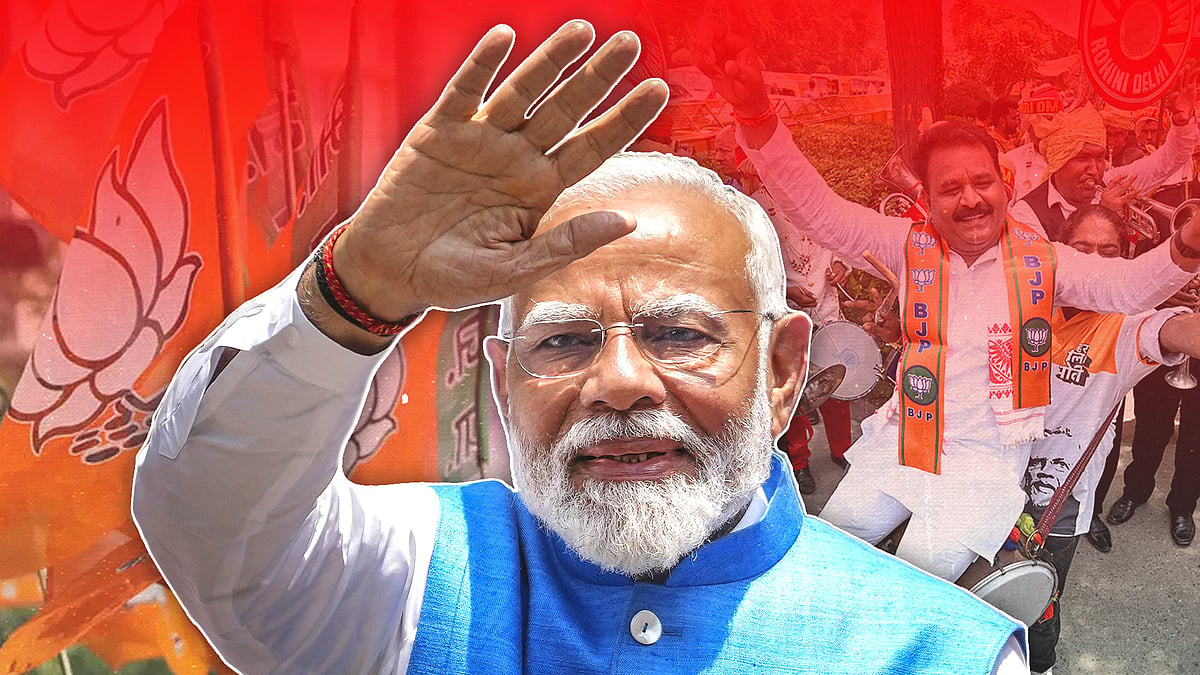114 cliffhanger contests, 72% of 54 NDA wins in states governed by BJP, allies
The victory margin was less than 50,000 in 114 seats and less than 10,000 in 20 constituencies.
Narendra Modi is set to take the oath as Prime Minister for a third term, albeit with the support of the BJP allies. The saffron party’s tally has plummeted from 303 in 2019 to 240 now – well short of the 272 majority mark – while the Congress’s seat count has improved from 52 to 99.
The contest came close to being a cliffhanger with a thin victory margin in at least 114 seats, or 21 percent of the total 543 constituencies. However, the BJP-led NDA secured 294 seats, and the Congress-steered INDIA bloc is at 232.
Of the 114 seats with a victory margin of less than 50,000 votes, the INDIA alliance, at 56, has won more close contests than the 54 of the NDA, even though the former has fewer MPs. One such seat was won by Shiromani Akali Dal’s Harsimrat Kaur Badal in Bathinda and remaining three seats were claimed by independents. Meanwhile, opposition leaders in some BJP-governed states alleged that the state administration attempted to influence the vote count on June 4.
A margin of 50,000 would account for, on an average, less than 3 percent of the total registered voters.
Among the most fiercely fought contests – with a victory margin less than 10,000 – the INDIA bloc won 11 and the NDA won nine. Let’s map these victories.
Nail biting finishes in Uttar Pradesh, allegations of ‘BJP bias’
Of the 80 seats in Uttar Pradesh, the NDA has won 36, including 33 bagged by the BJP, against the INDIA bloc’s 43. Akhilesh Yadav-led Samajwadi Party has emerged as the biggest party in the state with 37 wins.
The contest in the populous state was especially thrilling in 32 constituencies where the victory margin was less than 50,000 votes – among these, the BJP grabbed 17 against the SP’s 13, and two by the NDA allies.
There were six seats where the victory margin was less than 10,000 votes. Of these, the SP won three – Hamirpur, Salempur and Daurahra – and the BJP bagged the rest – Farrukhabad, Bansgaon and Phulpur.
SP chief Akhilesh Yadav and Congress’s Jairam Ramesh alleged that the state administrative officials were “hand-in-glove” with the BJP-led UP government to push its candidates’ victory on the results day on June 4.
Yadav told ANI: “But at several places in Uttar Pradesh, it was seen that the administration made candidates lose deliberately. Farrukhabad is one such example; the entire administration there was working for the government.”
Notably, BJP’s Mukesh Rajput won by 2,678 votes against SP’s Naval Kishor Sakhya in Farrukhabad.
Jairam Ramesh tweeted on the results day: “With phone calls, district officials are being pressured into getting seats won [for the BJP] in Uttar Pradesh’s Maharajganj, Bansgaon, Meerut, Muzaffarnagar. Administration officials should remember that the government is changing and this mockery of democracy will not be accepted.”
Beyond UP, the Jaipur Rural constituency in BJP-governed Rajasthan saw a victory margin of 1,615 in favour of the BJP’s Rao Rajendra Singh. Congress’s losing candidate, Anil Chopra, demanded a recount of votes, and state Congress chief Govind Singh Dotasara suspected “tampering” with the vote count.
State-wise seats with less than 50,000 victory margins
Of the 54 close wins for the NDA, as many as 39, or over 72 percent, were in states governed by the BJP or its allies. Separately, Andaman and Nicobar Islands, under the centre’s administration, also witnessed a tight contest eventually won by the BJP.
As many as 15 of these seats for the NDA came from Uttar Pradesh alone.

For the INDIA bloc, as many as 29, or more than half of its 56 wins with less than 50,000 margin were in states governed by the NDA. Most of these contests were witnessed in UP, where the SP won 13 such seats.
The remaining 25 MP elects of the INDIA bloc who won in a tight contest were chosen in states where the Congress or its alliance partners are in power. It also won two such contests in the UTs of Chandigarh and Lakshadweep.
Victories with less than 10,000 margin
As many as 20 seats recorded a victory margin of less than 10,000 votes. At least 11 of these were bagged by the INDIA bloc and nine were in the NDA’s kitty.

The INDIA bloc won five of these 11 seats in NDA-governed states and two in central government-run UTs of Chandigarh and Lakshwadweep. The rest of the constituencies were in states governed by INDIA partners.
The Congress won one such seat in Kerala’s Attingal with the least margin of 684 votes. The party’s vote margin in five other constituencies were: Chandigarh at 2,504; Lakshadweep at 2,647; Punjab’s Firozpur at 3,242; Maharashtra’s Dhule at 3,831; and Tamil Nadu’s Virudhunagar at 4,379.
In UP, the SP secured Hamirpur with a margin of 2,629 votes, Salempur with 3,573, and Dhaurahra with a 4,449 vote margin. Mamata Banerjee-led Trinamool Congress secured Arambagh in West Bengal with a 6,399 vote margin; and Sharad Pawar’s NCP won Beed in Maharashtra with a margin of 6,553 votes.
For the NDA, five of the nine seats it won with less than 10,000 vote margin were secured in states governed by the BJP.
In UP, the BJP won Farrukhabad with a margin of 2,678 votes, Bansgaon with 3,150, and Phulpur with a 4,332 vote margin.
Eknath Shinde’s Shiv Sena, a BJP-ally, won Mumbai North West with a record low margin of 48 votes to elect Ravindra Dattaram Waikar.
The BJP also won from Odisha’s Jajpur with a margin of 1,587 votes, Rajasthan’s Jaipur Rural with a 1,615 vote margin, Chhattisgarh’s Kanker with 1,884, Telangana’s Mahbubnagar with 4,500, and West Bengal’s Bishnupur with 5,567.
Small teams can do great things. All it takes is a subscription. Subscribe now and power Newslaundry’s work.
 Nitish is back as maximiser, but his elbow room is limited
Nitish is back as maximiser, but his elbow room is limited The 2024 mandate is a risk to Modi’s sledgehammer politics
The 2024 mandate is a risk to Modi’s sledgehammer politics